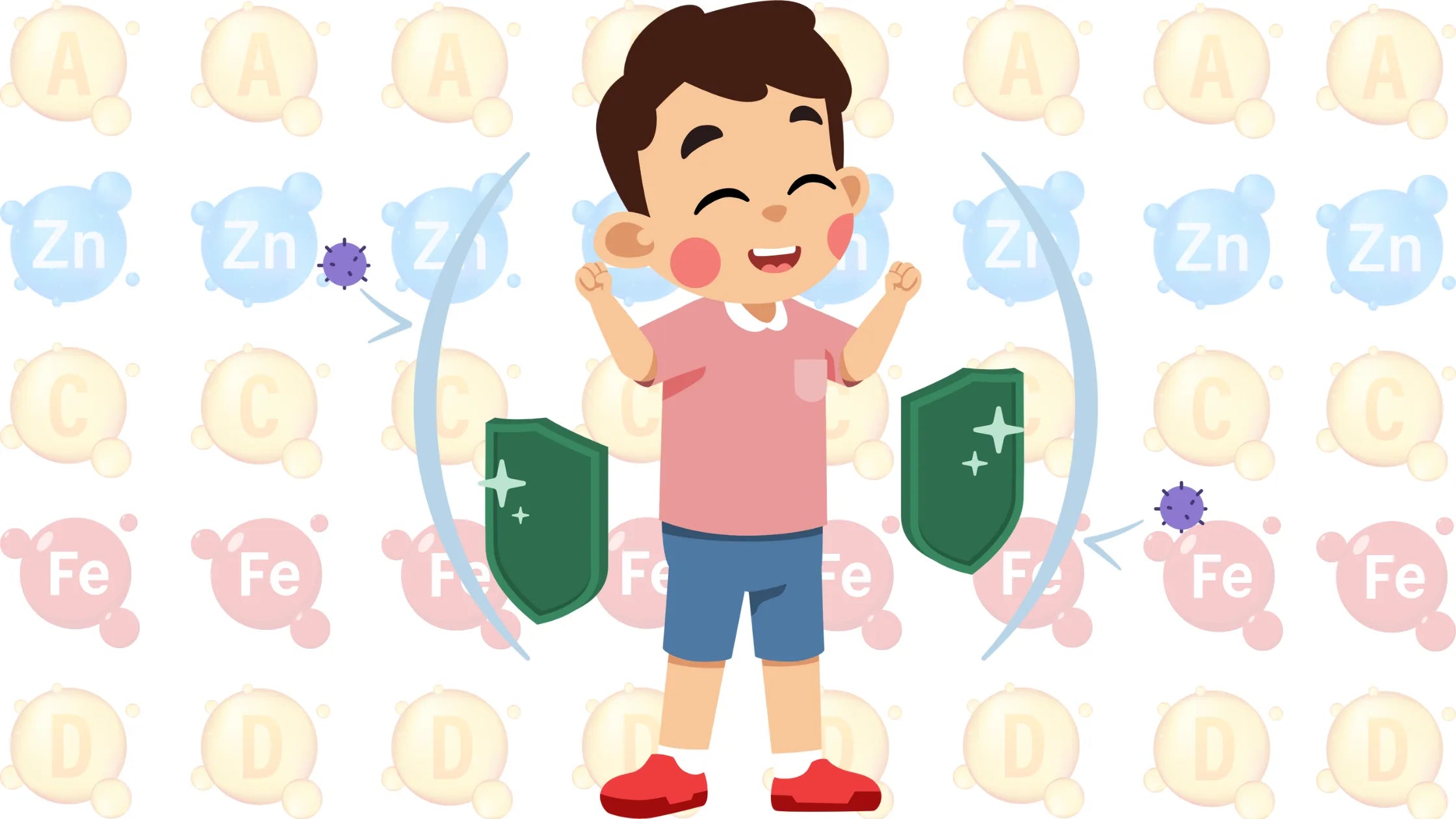A diet of fruits, veggies, whole grains, and lean proteins will boost your child’s energy and mood. A balanced diet keeps kids strong. It also increases their minds and emotions, ensuring their happiness. Small diet changes can significantly improve your child’s behaviour and health. This will lead to a better, healthier future. Let’s discover how vitamin deficiency in children can impact your child’s well-being and health.

Behavioural Changes Linked To Vitamin Deficiency In Children
Vitamin deficits in children can profoundly impact their behaviour and cognitive function. Vitamins are vital for brain and nerve function. They affect mood, focus, and mental health. When children lack these nutrients, they may develop various behavioural problems.
- Irritability and mood swings
Deficiency: Irritability and mood swings are often linked with vitamins B6 and B12.
The National Institute of Health says Vitamins B6 and B12 are vital for neuron activity, which affects mood. A lack of these vitamins can cause emotional instability, making children more prone to irritability and mood swings.

2. Difficulty concentrating and hyperactivity
Deficiency: Difficulty and hyperactivity are often linked with iron and vitamin D.
Vitamin D and iron are essential for cognitive functions. Studies show that low vitamin D and iron can cause ADHD symptoms. Children with these nutrient deficiencies may struggle to concentrate and exhibit hyperactive tendencies.

- Fatigue and lethargy
Deficiency: Fatigue and lethargy are often linked with B12 and iron.
A National Institute of Health study states that vitamin B12 and iron help make red blood cells. They boost energy levels. These vitamins are necessary to avoid fatigue and low enthusiasm for daily activities.

- Anxiety and Depression
Deficiency: Anxiety and depression are often linked with omega-3 and folate (B9).
A study found that omega-3s and folate help manage mood. Lack of these nutrients can increase anxiety and depression in children.

- Sleep Disturbance
Deficiency: Magnesium and Vitamin D deficiencies are linked to sleep disturbance.
A study in Kenya says magnesium and vitamin D help sleep and stress. Deficiencies can cause insomnia or abnormal sleep patterns.

How to Identify Vitamin Deficiency In Children?
- Signs and Symptoms: A study says common signs of vitamin deficiency in children are fatigue, low energy levels, and difficulty concentrating. Physical symptoms include dry skin, bleeding gums, and brittle hair/nails.
- Consult a Pediatrician: If you suspect a deficiency, you should seek medical attention. They can conduct blood tests to determine levels of specific vitamins and minerals, such as vitamin D and iron.
- Regular Monitoring: Keep track of your child’s eating habits and health status. Regular check-ups with a paediatrician can help ensure they are fulfilling their nutritional requirements.
Food and Supplements To Improve Vitamin Level
A well-balanced diet rich in specific foods and supplements can help children boost their vitamin levels. Here’s a quick overview of vital vitamins and their food sources.
Foods to Increase Vitamin Levels
Sources for Vitamins B6 and B12:
- B6: The sources include lean meats, fish, poultry, bananas, almonds, whole grains, and fortified cereals.
These vitamins help in normal brain development.

- B12: The Sources include meat, fish, eggs, dairy products, and fortified breakfast cereals.
These vitamins promote energy production and red blood cell development.

- Folate (Vitamin B9) Sources include leafy greens (spinach, kale), legumes (beans, lentils), and fortified cereals.
These vitamins are essential for DNA synthesis and cell division.

- Vitamin D sources include fatty fish (such as salmon and mackerel), egg yolks, UV-exposed mushrooms, and fortified dairy products.
These vitamins help with calcium absorption and bone health.

- Vitamin C sources include citrus fruits (oranges, lemons), strawberries, bell peppers, broccoli, and dark leafy greens.
These vitamins boost the immune system and improve iron absorption.

- Vitamin E sources include almonds, seeds, sunflower oil, and green leafy vegetables.
These vitamins act as antioxidants and support immunological function.

Supplements
Supplements may be prescribed if a child’s food intake is inadequate or if a healthcare provider has identified specific deficiencies. Always see a paediatrician before beginning any supplement program.
You can give your child high-quality supplements, such as Route2Health’s Kid’s One Daily multivitamin supplement, designed to provide essential minerals and vitamins that children may lack.

The Key To Preventing Vitamin Deficiency In Children
According to a study by Harvard Medical School, Adopting a diverse, healthy diet is the greatest way to ensure that you acquire a variety of vitamins and minerals in sufficient amounts. This includes focusing on fruits and vegetables, whole grains, beans and lentils, low-fat protein, and dairy products. The good news is that many common foods offer various mineral and vitamin sources, making it simple to achieve your daily requirements through regular meals.
Having foods according to My Plate by USDA is the key
- Fruits
- Whole Grains
- Vegetables
- Lean Protein
- Healthy Fats
- Dairy

Conclusion
understanding the link between vitamin deficiencies and behavioral changes may be difficult in promoting children’s mental well-being. Parents may help their children’s general well-being and development by encouraging them to eat a balanced diet rich in vitamins and minerals.
Route2Health’s Kid’s One Daily multivitamin supplement is intended to supply essential minerals and vitamins that children may be deficient in. It is also a great option for parents who want to ensure their child gets the vitamins they need for healthy growth and development.
FAQs
- What vitamin shortage leads to misconduct in children?
Vitamin D deficiency leads to misconduct in children.
- What deficit causes mood swings in children?
Lack of serotonin or dopamine due to mood swings in children due to inadequate diet
- Which vitamin deficiency creates aggression?
Zinc deficiency can lead to aggression in children.
- How do I ensure that my child has sufficient vitamin D?
A diet rich in vitamin D, like eggs, fish, milk and 20-30 mins exposure to sunlight.
- How can I know if my kid is vitamin deficient?
Symptoms like Fatigue, frequent illness, and lack of concentration can ensure vitamin deficiency.
- What are the mental impacts of a vitamin deficiency?
Anxiety, memory loss and irritability.
























































